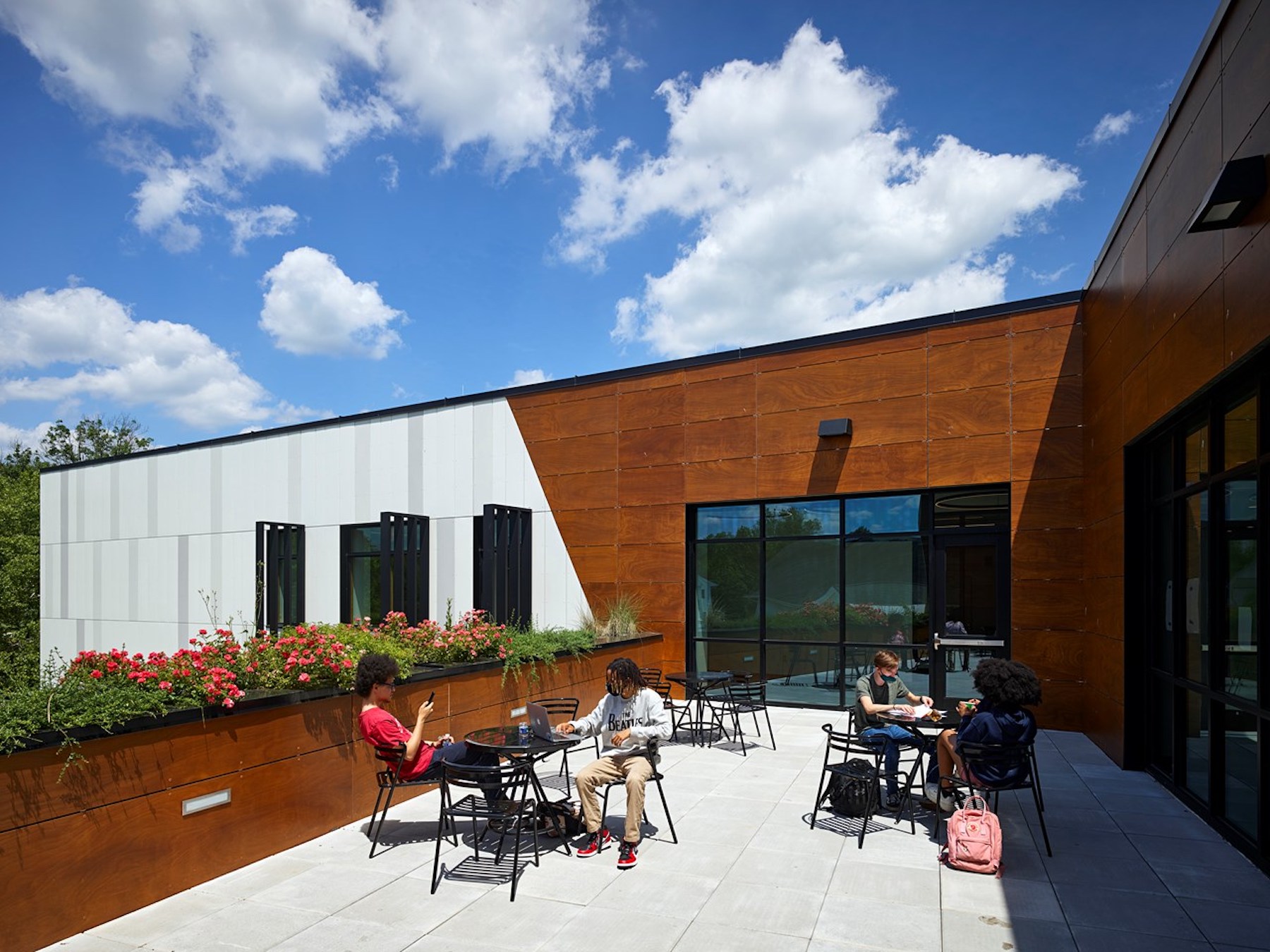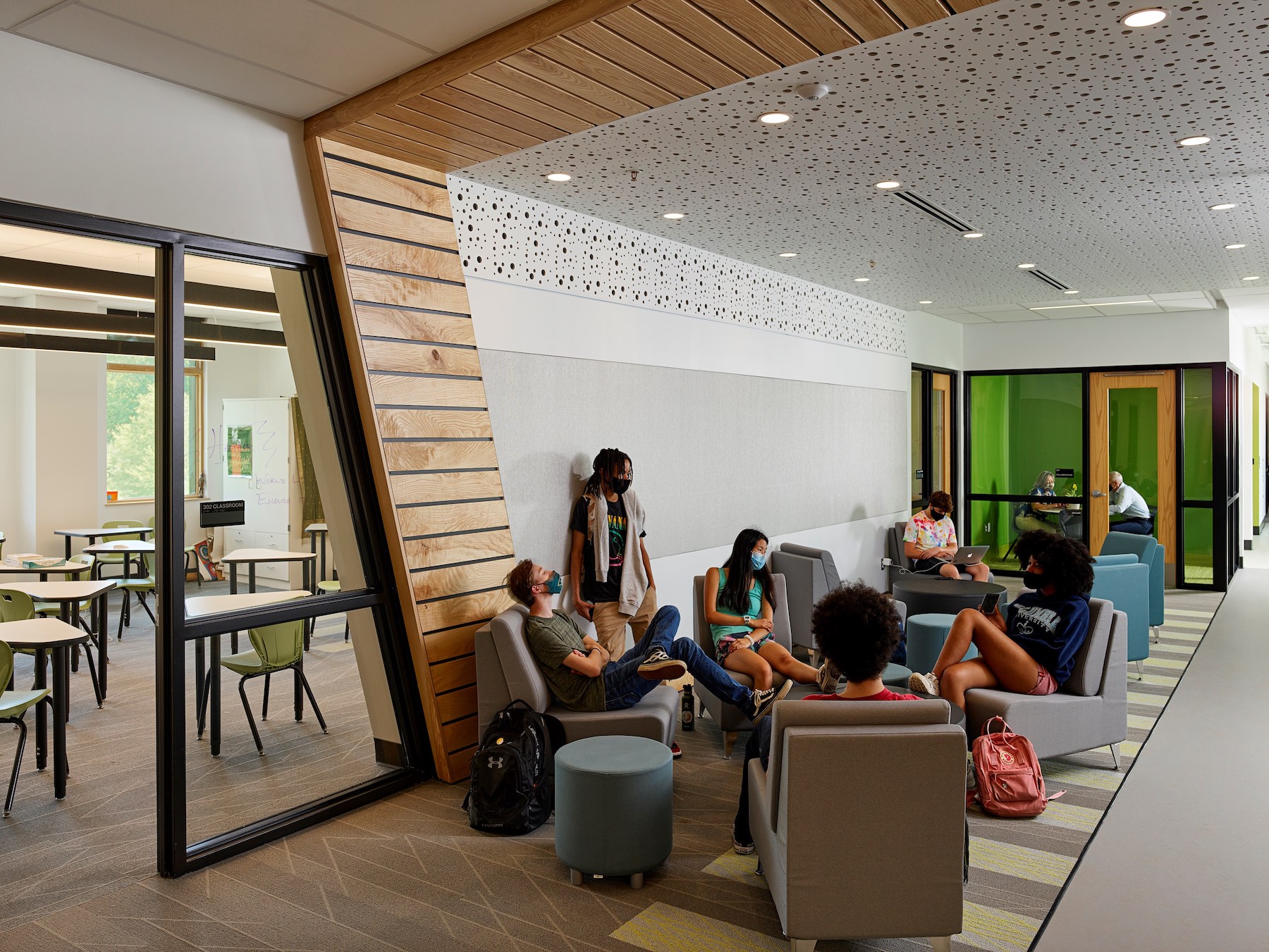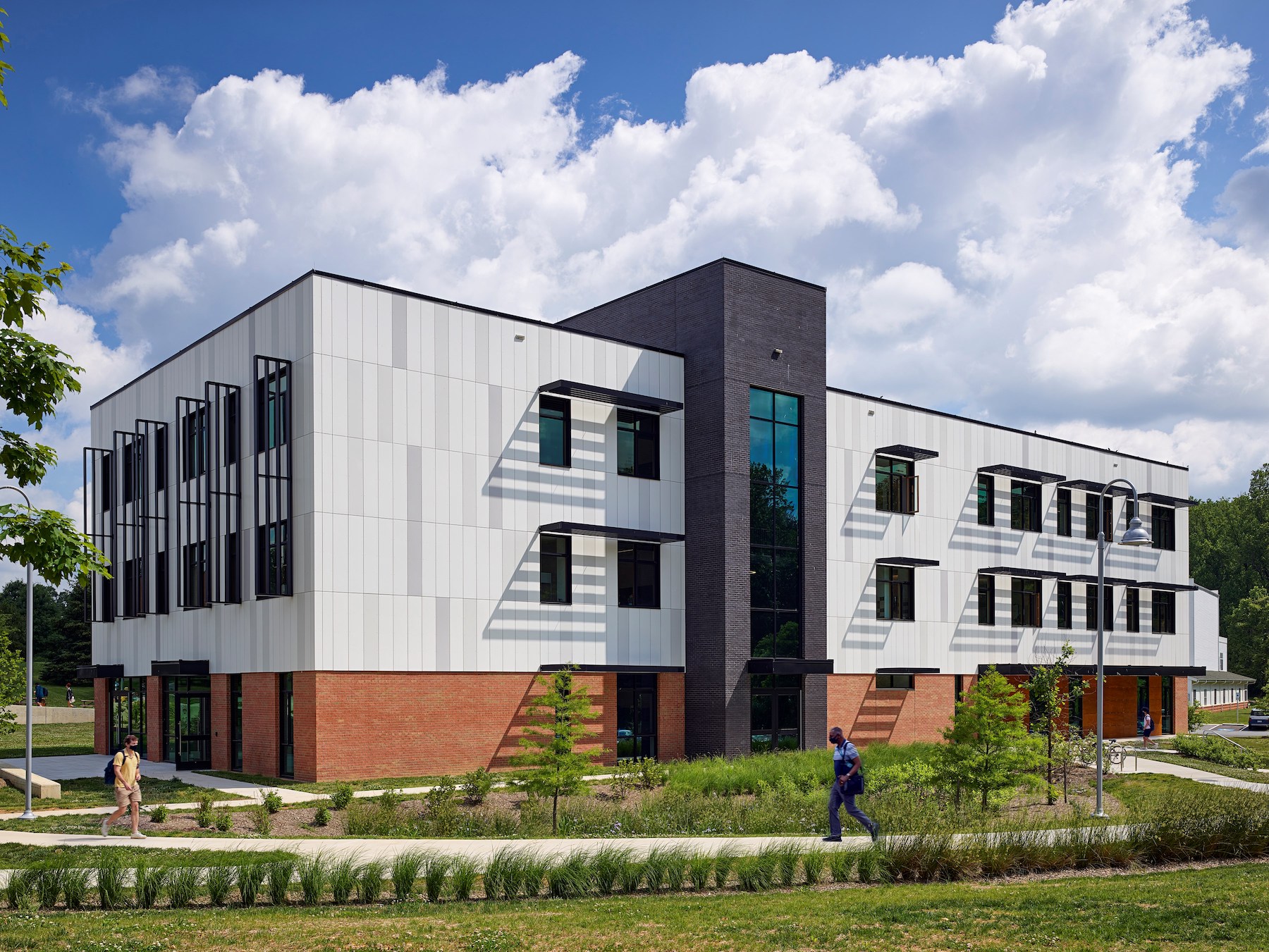Designed by Stantec, a Quaker high school is the first in the US to receive WELL Gold certification, which recognizes a commitment to occupants’ health and well-being. Part of the Sandy Spring Friends School (SSFS), the new Pen y Bryn Upper School serves students in grades 9 through 12. Stantec provided architecture, interior design, and engineering for the Upper School.
Founded in 1961, the SSFS campus houses multiple educational buildings for more than 650 students from preschool through 12th grade. SSFS sits on a pastoral 140-acre campus in Maryland, midway between Baltimore and Washington, D.C.
Stantec’s simple, elegant design is meant to align with the school’s Quaker values of simplicity, peace, integrity, community, equality, and stewardship. In the new Upper School, students and teachers have access to a variety of educational environments—traditional classrooms, open or closed collaboration areas, and social spaces—that offer dynamic lighting solutions and flexible, ergonomic furniture.
The design features a biophilic strategy involving both environmental elements and energy solutions. The building extends learning to the outdoors with a covered front porch beside a meditation garden, a sunny maker-space patio, and a roof terrace. Inside, expanses of floor-to-ceiling glass provide daylight and exterior views in the classrooms, collaboration areas, offices, and social areas. The interior also incorporates large areas of ash wood walls created from trees reclaimed onsite.
In addition to its WELL Gold design, the Upper School is engineered as a net zero energy-ready facility: The total amount of energy used by the building annually roughly equals the amount of renewable energy created on the site or nearby.
On the building team:
Owner: Sandy Spring Friends School
Design architect and architect of record: Stantec
MEP engineer: 2RW Consultants
Structural engineer: Keast & Hood
General contractor/construction manager: Keller Brothers, Inc.
Civil engineer: Stantec
Landscape architect: Brian J. Stephenson + Company
WELL building consultant: Delos Living


Related Stories
| Aug 11, 2010
Bronze Award: Garfield High School, Seattle, Wash.
Renovations to Seattle's historic Garfield High School focused mainly on restoring the 85-year-old building's faded beauty and creating a more usable and modern interior. The 243,000-sf school (whose alumni include the impresario Quincy Jones) was so functionally inadequate that officials briefly considered razing it.
| Aug 11, 2010
Managing the K-12 Portfolio
In 1995, the city of New Haven, Conn., launched a program to build five new schools and renovate and upgrade seven others. At the time, city officials could not have envisioned their program morphing into a 17-year, 44-school, $1.5 billion project to completely overhaul its entire portfolio of K-12 facilities for nearly 23,000 students.
| Aug 11, 2010
Financial Wizardry Builds a Community
At 69 square miles, Vineland is New Jersey's largest city, at least in geographic area, and it has a rich history. It was established in 1861 as a planned community (well before there were such things) by the utopian Charles Landis. It was in Vineland that Dr. Thomas Welch found a way to preserve grape juice without fermenting it, creating a wine substitute for church use (the town was dry).
| Aug 11, 2010
School Project Offers Lessons in Construction Realities
Imagine this scenario: You're planning a $32.9 million project involving 112,000 sf of new construction and renovation work, and your job site is an active 32-acre junior-K-to-12 school campus bordered by well-heeled neighbors who are extremely concerned about construction noise and traffic. Add to that the fact that within 30 days of groundbreaking, the general contractor gets canned.
| Aug 11, 2010
High Tech High International used to be a military facility
High Tech High International, reconstructed inside a 1952 Navy metal foundry training facility, incorporates the very latest in teaching technology with a centerpiece classroom known as the UN Theater, which is modeled after the UN chambers in New York. The interior space, which looks more like a hip advertising studio than a public high school, provides informal, flexible seating areas, abunda...
| Aug 11, 2010
High-Performance Modular Classrooms Hit the Market
Over a five-day stretch last December, students at the Carroll School in Lincoln, Mass., witnessed the installation of a modular classroom building like no other. The new 950-sf structure, which will serve as the school's tutoring offices for the next few years, is loaded with sustainable features like sun-tunnel skylights, doubled-insulated low-e glazing, a cool roof, light shelves, bamboo tri...
| Aug 11, 2010
Special Recognition: Pioneering Efforts Continue Trade School Legacy
Worcester, Mass., is the birthplace of vocational education, beginning with the pioneering efforts of Milton P. Higgins, who opened the Worcester Trade School in 1908. The school's original facility served this central Massachusetts community for nearly 100 years until its state-of-the-art replacement opened in 2006 as the 1,500-student Worchester Technical High School.
| Aug 11, 2010
BIM school, green school: California's newest high-performance school
Nestled deep in the Napa Valley, the city of American Canyon is one of a number of new communities in Northern California that have experienced tremendous growth in the last five years. Located 42 miles northeast of San Francisco, American Canyon had a population of just over 9,000 in 2000; by 2008, that figure stood at 15,276, with 28% of the population under age 18.
| Aug 11, 2010
8 Tips for Converting Remnant Buildings Into Schools
Faced with overcrowded schools and ever-shrinking capital budgets, more and more school districts are turning to the existing building stock for their next school expansion project. Retail malls, big-box stores, warehouses, and even dingy old garages are being transformed into high-performance learning spaces, and at a fraction of the cost and time required to build classrooms from the ground up.
| Aug 11, 2010
Special Recognition: Kingswood School Bloomfield Hills, Mich.
Kingswood School is perhaps the best example of Eliel Saarinen's work in North America. Designed in 1930 by the Finnish-born architect, the building was inspired by Frank Lloyd Wright's Prairie Style, with wide overhanging hipped roofs, long horizontal bands of windows, decorative leaded glass doors, and asymmetrical massing of elements.







